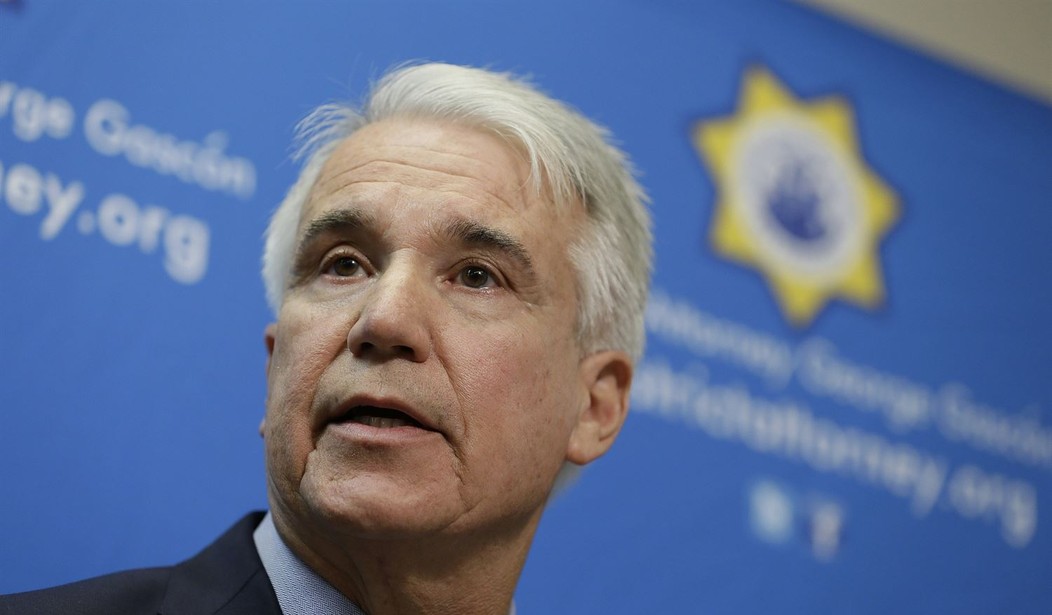New Los Angeles District Attorney George Gascon has had the most active first week on the job of probably any officeholder ever, anywhere. On Day One he issued nine Special Directives to his staff, instituting a wet dream of Black Lives Matter and Antifa justice policies – and decreed that those policies should be implemented in all pending cases and even up to 20,000 cases in which the criminals were already sentenced.
On Day Two he dropped charges against a “protester” accused of trying to wreck a train (you read that right) during a protest against the LA Sheriff’s Department after deputies shot and killed a known gang member and drug dealer, Dijon Kizzee, who’d pulled a gun on them.
We can’t wait to see what the rest of the week will bring.
In a piece published earlier this week we featured comments from a Deputy District Attorney (DDA) in another California county about the practical effect of taking enhancements off the table completely and failing to file strike allegations. Now a Deputy District Attorney in Gascon’s own office says this policy isn’t just bad for public safety; it directs DDA’s to “not follow clear statutory and decisional law.” Obviously the whistleblower does not want their name used, but the sentiment isn’t unique to one employee in the office. RedState has heard from numerous DDA’s who say Gascon’s policies direct them to commit unethical or illegal acts.
The whistleblower wrote the following, which is also posted on the Recall George Gascon Facebook page (which grew to over 4,000 members on the day it was created):
“Gascon Issues Illegal Special Directive
“Gascon’s sentencing special directive insists deputies do several things with strike allegations:
- Every DDA shall dismiss every special allegation, which includes all prior strike allegations for every open case. (This negates the second and third strike sentencing scheme at PC 667 and 1170.12 et. seq.) ;
- No DDA shall file strike allegations in any (future) case.
“Strike offenses are an incredible legal tool. The law can be abused, but the statute created a judicial safety valve to remove abuse. Typical sentences outside of the third strike law are a range, expressed in a triad. The typical felony ranges are 16 months, 2 or 3 years, or 2-3-5 years, and for more serious crimes things like 5-7-9, and 3-6-11 years.
“But, for second strike offenses, with a qualifying prior serious or violent offense, an offender’s sentence is doubled and five years is added to the defendant’s term. With a third strike offense, an offense moves from a determine term to an indeterminate term of 25-to-life for each offense.
“Normally, prosecutors enjoy vast and wide discretion in determining whether and what to charge in a criminal case. But, prosecutors have a statutory duty to “plead” and “prove” strike allegations. PC 1170.12(d)(1) and 667(g). Moreover, prosecutors cannot plea bargain strike offenses. (667(g)). This means, a blanket policy that disallows filing strike offenses is contrary to settled case law and the applicable statute. Moreover, the requirement that all strikes are to be dismissed (which requires a motion to the court and judicial approval incidentally) is also contrary to the plain language of the statute and applicable state law. However, striking a strike is a regular feature of felony criminal practice; but, it is done in the open, with the input from the defense, and the issue is ultimately decided by the judge, not the DDA.
“The District Attorney’s office may try to claim they are free to disregard the legislative language and directives as they are a separate branch of government and there must be a “separation of powers.” But cases have already denied such a claim.
“Essentially, the legislature may not dictate how an executive (prosecutor) should exercise their charging discretion. But, two courts have already denied separation of powers claims for strike charging. People v. Roman (2001) 92 Cal.App.4th 141, 145 (“. . . the Three Strikes Law limits [prosecutorial discretion] and requires the prosecutor to plead and prove each prior serious felony conviction. . . . [therefore] [a] prosecutor [may not] “unilaterally strike a prior serious felony conviction allegation, nor arbitrarily abandon a prosecution [cite]. When the jurisdiction of a court has been properly invoked by the filing of a criminal charge, the disposition of that charge becomes a judicial responsibility. [cite]). People v. Kilborn (1996) 41 Cal.App.4th 1325, 1333 (“. . . the Three strikes initiative did not violate the separation of powers provision of the State Constitution” with the court noting that charging discretion of prosecutors can and is limited by the legislature under the provisions of the Government Code — moreover, the legislature may also compel the district attorney to act with several examples.)
“So, the legislature and courts disallow prosecutors from indiscriminately dismissing strikes and indiscriminately refusing to file strike offenses. Strike allegations cannot be indiscriminately ignored because the legislators (and the proposition authors) considered this issue. And they drafted the language to require all strikes must be filed. This brings the authority into judicial review.
“So, filing deputies are forced to choose between obeying the special directive and decline filing the prior strike allegations — or — follow the statute and file the strike allegations. So the choice is horrible: Line DDAs (those with active cases) either decline to join the motion to dismiss the strikes, or make the motion to dismiss the strikes. In other words, here’s the choice as a sworn DDA: Disobey a written directive by your elected boss, or violate your oath and risk bar discipline for not following clear statutory and decisional law.
“No one should be put to this choice–and yet, 1,200 DDAs are now being asked to make these choices on the hour during the workday.
“This is wrong.”















Join the conversation as a VIP Member